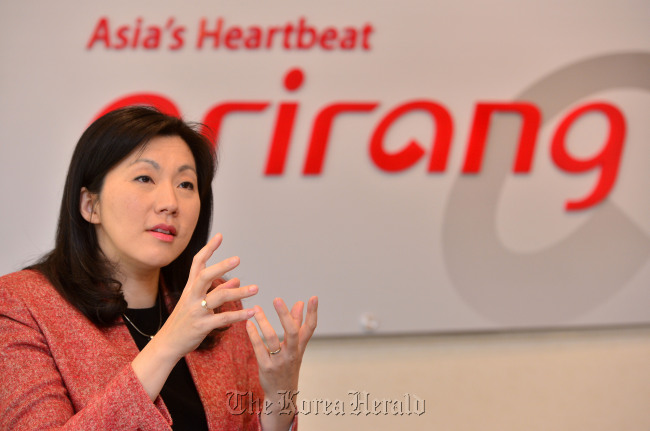
Arirang TV president Sohn Jie-ae speaks during an interview with The Korea Herald at her office Wednesday. (Lee Sang-sub/The Korea Herald)
In an interdependent world characterized by constant clashes of national interests, international media often find themselves pulled between their function as national advocates and the greater cause of serving the global common interest. Yet, it is in times of conflicts that the global media can play an important and unique role.
“When problems arise, global media can be forums for exploring common good,” said Sohn Jie-Ae, president of Arirang TV, an English-language network based in Seoul, in an interview with The Korea Herald on Wednesday.
The role and responsibilities of global media are among the topics being discussed at the Global Media Forum held under the theme of “Bridging the Divide” at the Grand Hilton Hotel in Seoul from Feb. 21-24. Some 300 participants, including 58 global media representatives from 29 countries, are attending the forum hosted by Arirang TV and the Korea Foundation.
On Friday, the CEO Roundtable will be followed by four panel sessions addressing the issues of East Asian security, cultural diversity, development, and public diplomacy as they relate to the global media, and a special session on global media’s future in the age of new media.
“The most interesting session, in my view, will be the last one on new media,” said Sohn. Representatives from Russia Today, Australian Broadcasting Corp. and BBC World, which are already actively engaged in new media, will be joined by officials from CJ Hello Vision, KT’s internet streaming service Ustream Korea, and Daum Communications Corp. as well as a representative from Rappler.com, a highly successful internet media company from the Philippines.
“The session will explore the transformation of global media in the face of new technologies. For example, new broadcasting and communications technologies using new media allow the growth of global media services without heavy investment,” said Sohn.
Founded in 1997, Arirang TV is received by more than 103 million households worldwide via eight satellites providing global coverage.
While Arirang TV is well known among global media, Sohn noted the rapid and expansive rise of China in the global media scene. With huge government investment ― CCTV’s budget for this year is an estimated 8 trillion won ― CCTV is making giant strides as a global media company. In comparison, Arirang TV’s budget for this year stands at 5.6 billion won, with 3.1 billion won coming from the government.
“CCTV is no longer perceived as purely propaganda. It is seen, rather, as offering an alternative perspective of Asia, much like how Al Jazeera has created more room for diverse perspectives,” Sohn explained.
With tension mounting in the Northeast Asian region over territorial disputes, the global media of the region could have an important role to play in representing their respective perspectives internationally as well as providing a forum for exploring common interests ― hence the need to bolster global media in Korea.
“Korea and Japan must do something in the face of the Chinese assault,” she said.
By Kim Hoo-ran (
khooran@heraldcorp.com)






